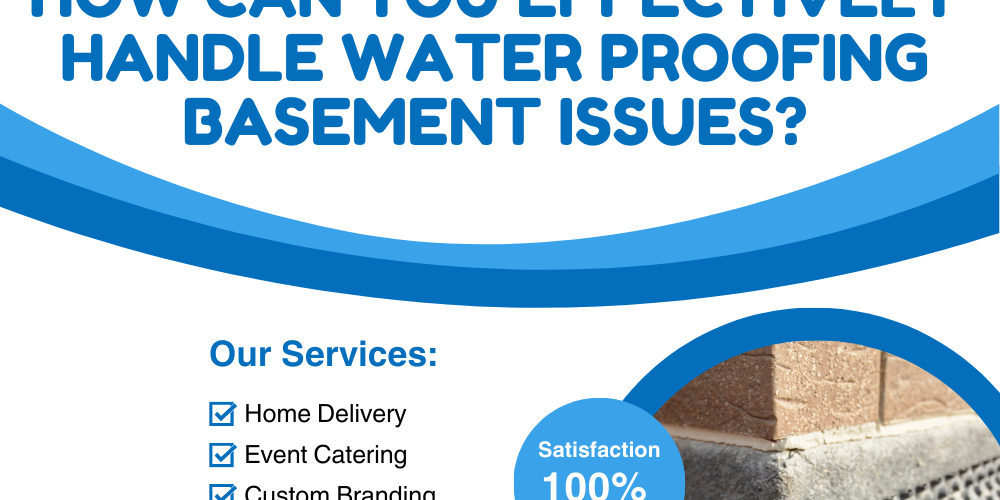Basements are essential spaces in many homes—used for storage, living areas, or even as rental units. But one persistent issue homeowners face is water proofing basement areas effectively. Without proper waterproofing, your basement becomes vulnerable to water damage, mold growth, and structural issues.
In this article, we’ll walk you through why basement waterproofing matters, signs you need it, available solutions, and how professionals like Lakhwa Chemical Services can help protect your home for the long term.
Why Water Proofing Basement Spaces Is So Important
Moisture in your basement isn’t just a minor inconvenience—it can lead to costly repairs and health concerns. Whether caused by groundwater pressure, poor drainage, or cracks in the foundation, water infiltration can weaken structural integrity and reduce your property value.
Key reasons to waterproof your basement include:
-
Preventing mold and mildew growth
-
Avoiding structural damage to walls and flooring
-
Protecting valuable belongings stored below ground
-
Increasing your home’s usable living space
-
Boosting resale value with a dry, healthy basement
Common Signs You Need Basement Waterproofing
If you notice any of the following, it may be time to take water proofing your basement seriously:
-
Damp or musty odors
-
Water stains on walls or floors
-
Efflorescence (white powdery substance) on walls
-
Visible cracks in foundation walls or floors
-
Peeling paint or wallpaper
-
Mold or mildew buildup
-
Standing water after rain
Even minor leaks can be warning signs of bigger issues.
Types of Basement Waterproofing Solutions
There are multiple ways to address basement waterproofing, depending on the source and severity of the issue. Below are the most common techniques:
1. Interior Waterproofing
This method focuses on managing water that has already entered the basement or is likely to seep in.
-
Sealants and Waterproof Paints: Quick fixes for minor leaks and dampness.
-
Interior Drainage Systems: French drains or sump pump systems that collect and redirect water from inside the basement.
-
Wall Liners: Vapor barriers that stop moisture from penetrating walls.
2. Exterior Waterproofing
Exterior waterproofing targets the root cause by preventing water from entering the basement in the first place.
-
Excavation and Membrane Installation: Digging around the foundation to apply waterproof coatings or membranes.
-
Proper Grading and Drainage: Ensuring the ground slopes away from your home.
-
Installing Exterior Drain Tiles: A system that captures water before it reaches the foundation.
3. Crack Injections
For small foundation cracks, polyurethane or epoxy injections are used to seal gaps and prevent water ingress.
DIY vs. Professional Waterproofing
While some interior methods like applying waterproof paint may seem easy, effective water proofing of a basement often requires expert assessment and specialized tools.
DIY May Be Suitable For:
-
Small, non-structural cracks
-
Applying sealant or waterproof coatings
-
Improving drainage with gutters or grading
Professional Waterproofing Is Best For:
-
Persistent or heavy water intrusion
-
Structural damage
-
Full drainage system installation
-
Long-term guarantees and peace of mind
Why Choose Lakhwa Chemical Services for Water Proofing Basement Work?
If you’re in Pakistan and need a reliable, expert solution for waterproofing your basement, Lakhwa Chemical Services is a trusted name in the field.
What Sets Them Apart:
-
Experienced Technicians: Trained professionals with years of field experience.
-
Custom Solutions: Every basement is different. Lakhwa Chemical Services tailors their approach based on your property’s needs.
-
High-Quality Materials: Use of industrial-grade waterproofing membranes, coatings, and sealants.
-
Affordable Packages: Budget-friendly rates without compromising on quality.
-
After-Sale Support: Regular inspections and customer care even after the job is done.
Lakhwa Chemical Services operates across major cities in Pakistan, offering both residential and commercial waterproofing services.
📞 Contact: +92-21-37223531
+92-315-2220060
+92-334-2266273
🌐 Website: www.waterproofing.pk
Maintenance Tips After Waterproofing
Once your basement is waterproofed, follow these tips to maintain a dry and healthy space:
-
Inspect gutters and downspouts regularly
-
Ensure proper lawn grading
-
Use a dehumidifier in humid climates
-
Check sump pumps for proper operation
-
Look for new cracks or signs of dampness
Final Thoughts
Water proofing basement spaces isn’t just a home improvement task—it’s a long-term investment in the safety, health, and value of your property. Whether you’re facing minor seepage or serious flooding, taking timely action can save you from costly repairs and stress down the line.
Let Lakhwa Chemical Services provide you with reliable, professional-grade waterproofing that lasts. Don’t wait for the next storm—protect your basement today.
Frequently Ask Questions
Q. What is the best way to waterproof your basement?
A. The best approach combines exterior membrane sealing, interior drainage systems, and sump pumps to fully protect against water intrusion.
Q. What is the method of waterproofing basement?
A. Basement waterproofing methods include interior sealants, crack injections, sump pumps, and exterior excavation with membrane application for long-term protection.
Q. Is it worth waterproofing a basement?
A. Yes, waterproofing prevents structural damage, mold growth, and property devaluation, making it a smart investment for long-term home protection.
Q. How do I stop water from coming up in my basement floor?
A. Install a sump pump, improve drainage, seal foundation cracks, and consider an interior French drain system to stop water from rising through the floor.
Q. What can I put on my basement floor to absorb water?
A. Use moisture-absorbing mats, silica gel packs, or a dehumidifier, but for recurring issues, professional waterproofing is recommended.
Q. How to fix groundwater seepage?
A. Correct grading outside your home, install proper drainage and sump systems, and seal foundation walls to prevent groundwater seepage into your basement.







